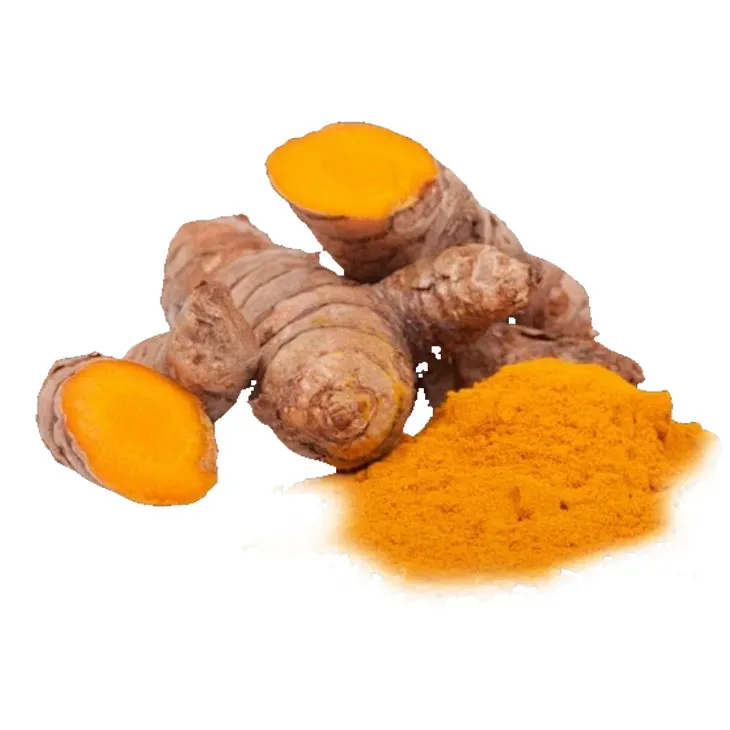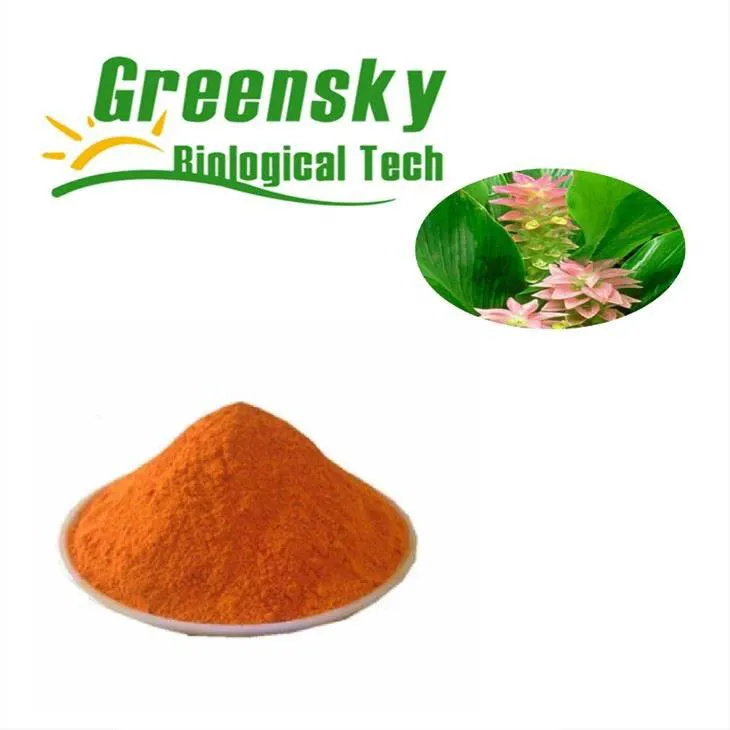- 0086-571-85302990
- sales@greenskybio.com
Uncover the Secrets: 8 Reasons Why You Must Know Curcumin.
2024-12-17

1. Introduction to Curcumin
Curcumin is a natural compound that is derived from turmeric, a spice commonly used in cooking, especially in Asian cuisine. Turmeric has been used for centuries in traditional medicine, and it is Curcumin that is responsible for many of its health - promoting properties. It has a bright yellow color, which not only gives turmeric its characteristic hue but also serves as a visual cue to its presence in various food and supplement products.

2. Anti - Inflammatory Properties
Chronic inflammation is at the root of many serious health conditions, such as heart disease, diabetes, and arthritis. Curcumin has powerful anti - inflammatory properties that can help combat this inflammation.
Inflammatory responses in the body are complex processes involving various signaling molecules. Curcumin can interfere with the activation of certain transcription factors, like NF - κB (nuclear factor kappa - light - chain - enhancer of activated B cells), which play a crucial role in the production of inflammatory cytokines. By inhibiting NF - κB, curcumin can reduce the levels of pro - inflammatory cytokines such as interleukin - 1β (IL - 1β), interleukin - 6 (IL - 6), and tumor necrosis factor - α (TNF - α).
This anti - inflammatory action of curcumin is not only beneficial for those already suffering from inflammatory diseases but also for those who want to maintain good health and prevent the onset of such conditions. For example, in arthritis patients, curcumin may help reduce joint pain and swelling by suppressing the inflammatory processes in the joints.

3. Antioxidant Capacity
Our bodies are constantly exposed to free radicals, which are unstable molecules that can cause damage to cells, proteins, and DNA. This oxidative damage is associated with aging and various diseases, including cancer and neurodegenerative disorders.
Curcumin is a potent antioxidant. It has the ability to neutralize free radicals by donating an electron, thus preventing them from causing further damage. Curcumin can scavenge a variety of free radicals, including superoxide anion radicals, hydroxyl radicals, and peroxyl radicals.
Moreover, curcumin can also enhance the body's own antioxidant defense systems. It can up - regulate the expression of antioxidant enzymes such as superoxide dismutase (SOD), catalase (CAT), and glutathione peroxidase (GPx). These enzymes play important roles in the body's natural defense against oxidative stress.

4. Brain Function Improvement
Curcumin has shown great potential in improving brain function and may play a role in preventing neurodegenerative disorders such as Alzheimer's and Parkinson's diseases.
One of the ways curcumin may benefit the brain is through its anti - inflammatory and antioxidant properties. Inflammation and oxidative stress are known to contribute to the development of neurodegenerative diseases. By reducing inflammation and neutralizing free radicals, curcumin can protect brain cells from damage.
Additionally, curcumin may also affect the levels of certain neurotransmitters in the brain. For example, it has been shown to increase levels of brain - derived neurotrophic factor (BDNF). BDNF is important for the growth, survival, and differentiation of neurons. Higher levels of BDNF can promote the formation of new synapses and improve synaptic plasticity, which are crucial for learning and memory processes.

5. Heart Health Benefits
Maintaining a healthy heart is essential for overall well - being. Curcumin offers several benefits for heart health.
Firstly, its anti - inflammatory properties can help reduce inflammation in the blood vessels. Chronic inflammation in the vascular endothelium is a risk factor for atherosclerosis, a condition characterized by the build - up of plaque in the arteries. By reducing this inflammation, curcumin may help prevent the development of atherosclerosis.
Secondly, curcumin can also improve lipid profiles. It has been shown to lower levels of LDL (low - density lipoprotein), often referred to as "bad cholesterol," while increasing levels of HDL (high - density lipoprotein), or "good cholesterol." This favorable change in lipid profiles can reduce the risk of heart disease.
Thirdly, curcumin may have a beneficial effect on blood pressure. Some studies have suggested that it can help relax blood vessels, which in turn can lead to a reduction in blood pressure. By controlling blood pressure, curcumin can further contribute to heart health.

6. Role in Cancer Prevention
While curcumin is not a cure for cancer, it has shown promising properties in cancer prevention.
At the cellular level, curcumin can interfere with multiple cancer - related processes. For instance, it can induce apoptosis (programmed cell death) in cancer cells. Cancer cells often have abnormal mechanisms that prevent them from undergoing apoptosis, allowing them to multiply uncontrollably. Curcumin can activate certain intracellular pathways that trigger apoptosis in cancer cells, thereby inhibiting their growth.
Curcumin can also inhibit angiogenesis, which is the process by which new blood vessels are formed to supply nutrients and oxygen to growing tumors. By blocking angiogenesis, curcumin can starve tumors and limit their growth and spread.
Moreover, curcumin may have the ability to modulate the immune system to better recognize and attack cancer cells. It can enhance the activity of immune cells such as natural killer cells and macrophages, which play important roles in the body's defense against cancer.
7. Digestive System Support
A healthy digestive system is crucial for proper nutrient absorption and overall health. Curcumin can provide significant support for the digestive system.
Curcumin has been shown to stimulate the production of bile by the liver. Bile is important for the digestion and absorption of fats in the small intestine. By increasing bile production, curcumin can enhance fat digestion and prevent the build - up of fats in the liver.
In addition, curcumin has anti - microbial properties. It can help fight against harmful bacteria in the digestive tract, such as Helicobacter pylori, which is associated with peptic ulcers and stomach cancer. By reducing the presence of these harmful bacteria, curcumin can maintain a healthy balance in the gut microbiota.
Curcumin may also have a role in reducing symptoms of digestive disorders such as irritable bowel syndrome (IBS). Its anti - inflammatory properties can help soothe the inflamed intestinal tissues, reducing pain, bloating, and diarrhea.
8. Other Potential Benefits
Besides the above - mentioned benefits, curcumin may have other potential advantages for health.
For example, it may play a role in improving skin health. Curcumin's antioxidant and anti - inflammatory properties can help protect the skin from damage caused by UV radiation, pollution, and aging. It may also be effective in treating certain skin conditions such as psoriasis and eczema.
Curcumin has also been studied for its potential in improving joint mobility and reducing muscle soreness. Athletes and fitness enthusiasts may find it beneficial in enhancing their performance and speeding up recovery after exercise.
Additionally, some research suggests that curcumin may have a positive impact on mental health. It may help reduce symptoms of depression and anxiety, possibly through its effects on neurotransmitter levels and inflammation in the brain.
9. Conclusion
In conclusion, curcumin is a remarkable natural compound with a wide range of health benefits. Its anti - inflammatory, antioxidant, and other properties make it a valuable addition to a healthy lifestyle. Whether it is for preventing chronic diseases, improving brain function, maintaining heart health, or supporting the digestive system, curcumin has a lot to offer.
However, it is important to note that while curcumin shows great potential, more research is still needed to fully understand its mechanisms of action and to optimize its use. Also, when considering using curcumin supplements, it is advisable to consult a healthcare professional, especially for those with pre - existing medical conditions or those taking other medications.
FAQ:
What is curcumin?
Curcumin is a natural compound that is found in turmeric. It is responsible for the yellow color of turmeric and has many beneficial properties.
How does curcumin have anti - inflammatory properties?
Curcumin can inhibit certain enzymes and molecules in the body that are involved in the inflammatory process. By doing so, it helps to reduce inflammation and can be beneficial in combating various chronic diseases.
Can curcumin really improve brain function?
There is evidence to suggest that curcumin may improve brain function. It has been studied for its potential to cross the blood - brain barrier and has antioxidant and anti - inflammatory effects in the brain. These properties may help in preventing neurodegenerative disorders.
What role does curcumin play in heart health?
Curcumin may play several roles in heart health. It can help to reduce inflammation in the blood vessels, improve lipid profiles, and may also have antioxidant effects that protect the heart from damage.
How is curcumin related to cancer prevention?
Curcumin has been studied for its potential anti - cancer properties. It can affect various cellular processes involved in cancer development, such as cell growth, apoptosis (programmed cell death), and angiogenesis (the formation of new blood vessels that tumors need to grow). However, more research is still needed.
Related literature
- The Bioactivity of Curcumin: From Turmeric Spice to Potential Cancer Treatment"
- "Curcumin and Heart Health: A Review of the Evidence"
- "The Role of Curcumin in Brain Health and Neurodegenerative Diseases"
- ▶ Hesperidin
- ▶ citrus bioflavonoids
- ▶ plant extract
- ▶ lycopene
- ▶ Diosmin
- ▶ Grape seed extract
- ▶ Sea buckthorn Juice Powder
- ▶ Beetroot powder
- ▶ Hops Extract
- ▶ Artichoke Extract
- ▶ Reishi mushroom extract
- ▶ Astaxanthin
- ▶ Green Tea Extract
- ▶ Curcumin Extract
- ▶ Horse Chestnut Extract
- ▶ Other Problems
- ▶ Boswellia Serrata Extract
- ▶ Resveratrol Extract
- ▶ Marigold Extract
- ▶ Grape Leaf Extract
- ▶ blog3
- ▶ blog4
- ▶ blog5
-
Nettle Root Extract
2024-12-17
-
Nutmeg Extract
2024-12-17
-
Coconut Water Powder
2024-12-17
-
Konjac Powder
2024-12-17
-
Almond Extract Powder
2024-12-17
-
Apricot Powder
2024-12-17
-
Red Wine Extract
2024-12-17
-
Polygonum Cuspidatum Extract
2024-12-17
-
Tinospora cordifolia extract
2024-12-17
-
Alisma Extract
2024-12-17





















